Vilma Butrimaitė-Mikšionė is a successful entrepreneur, co-owner, and managing partner at Academia Dominorum. Her daily work involves business development tasks such as sales, marketing, customer service, and communication. Currently, Vilma is pursuing a Master’s degree in Integrated Communication at Kazimieras Simonavicius University (KSU). In this interview, she shares insights about her career and her experience at KSU.
What influenced your decision to pursue a Master’s degree in Integrated Communication at KSU?
Academia Dominorum is celebrating its fifth year in business. Through this venture, I’ve grown personally, expanded my knowledge, and met many new people. My extensive leadership experience in aviation industry has allowed me to share the competencies I’ve gained, such as leadership skills, planning, process improvement, and team development. I’ve always wanted to share my expertise and knowledge, which is why I continually pursue learning. For me, lifelong learning is the “engine” that drives me forward. In today’s dynamic world, I can’t imagine myself progressing without self-improvement and new knowledge.”
Why did you choose to study Integrated Communication at KSU?
Communication plays an essential role in life, whether viewed through an organizational or personal lens. It’s the core that connects other areas like leadership, communication, collaboration, processes, and project management. This realization led me to pursue a Master degree in Integrated Communication at KSU.
I chose KSU based on a recommendation from a colleague who had studied there. He spoke highly of the quality of education and the lecturers.
Is it possible to balance studies and business? How do you manage it?
I really like the saying, ‘If you want and can’t, it means you don’t want enough.’ There’s a lot of truth to it. When you have a clear goal, set your direction, and focus on it, anything is possible. It’s just a matter of prioritization. The flexible study schedule, accommodating lecturers, and small class sizes make it easier to balance studies with my other responsibilities.
What has been your biggest discovery while studying for your Master’s?
I’ve realized that when you have practical work experience, studying becomes even more interesting and beneficial. Some lecturers have also shared that classes with students who have work experience are more engaging and valuable. It creates a reciprocal learning environment where both students and lecturers gain insights.
What are the Integrated Communication studies like at KSU?
The studies are incredibly diverse in terms of subjects. They cover a wide range of communication areas, from personal branding to legal communication regulation, as well as strategic planning and management. One key takeaway is that it’s not just about what we communicate, but also how we communicate. Communication is a dynamic, ever-evolving process that adapts to changes in the environment, audience, and technology.”
How would you describe the lecturers in the programme?
For me, the greatest value comes from the lecturers who are practitioners in their fields, and the majority of KSU’s lecturers are just that. It’s been extremely beneficial and interesting to learn not only theoretical concepts but also to hear about their personal and professional experiences.
Are you applying the knowledge you’ve gained at KSU in your work?
Absolutely, yes.
What would you say to colleagues who are unsure about starting their studies?
I would share this interview because it highlights only the best aspects of studying at KSU! But seriously, the best investment you can make is in yourself. I would encourage anyone to start studying without delay.
What three words best describe KSU?
– Modern/innovative
– Compact (small student groups)
– Flexible (flexible study schedule)
What is your life motto?
Everything starts with the ability to understand yourself. Once you understand yourself, you can better understand those around you and encourage their growth as well.
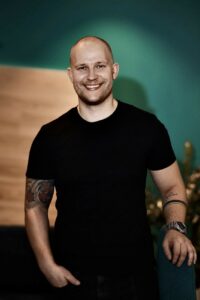
Janis Sadinovs (37), former Global Expansions People Lead at Bolt and founder of Pathway Forward, delivered a lecture to KSU students on December 17th, focusing on the key components of career success, professional growth, and personal development.
We caught up with Janis just before the holidays and joked about the festive season being a time for making promises to oneself.
Janis remarked that the New Year is an excellent opportunity to reflect on personal progress, emphasising that personal growth is an ongoing journey. He highlighted that the most important step is to start making changes. To ensure these changes are sustainable and long-lasting, Janis shared his valuable insights.
What do you do?
Now, I run my consultancy called Pathway Forward. I’m an HR leader, primarily working with founders and early-stage teams. My focus is on ensuring these teams are set up for success, helping them mature and scale.
Can you share your experience of personal growth?
My journey started after school, when I was uncertain about what to do next. I went into law because it seemed like a stable and safe choice, and my father was a lawyer. I did enjoy the process and even worked in the field for a while, but I eventually realized it wasn’t my calling. That was a pivotal moment for me to reflect on what truly aligns with my strengths and passions.
Often, we choose paths based on external influences—what our parents want, what our friends are doing, or what’s trendy at the time. For instance, when I was in university, everyone was going into international relations, but that wasn’t necessarily my passion. It was important for me to engage in self-reflection and ask: What do I really want? What am I passionate about?
How can young people figure out what they truly want to do?
The key is understanding who you are and what you value in life. What goals do you want to pursue? When you focus on something you’re passionate about, you’re much more likely to be resilient, adapt to challenges, and keep growing. Passion fuels the ability to re-skill, adapt, and thrive in a constantly changing world. Personal growth doesn’t need to be a pressure-filled journey—it’s about finding what excites and motivates you. And don’t get overwhelmed by all the self-help books and motivational speakers. Instead, focus on the simple question: What do I care about, and why?
What were some of the biggest challenges you faced in your personal growth journey, and how did you overcome them?
One significant challenge was when I was in what I thought was the pinnacle of my career at age 29, with a great job and salary, but I wasn’t passionate about it. I was experiencing burnout, and I realized that if I took on more responsibility, I’d never have the freedom I wanted. So, I quit my job, despite the uncertainty, and traveled to Latin America. There was a lot of fear about how this might affect my career, but I trusted my intuition. The experience opened my eyes, helped me grow, and brought new perspectives. I returned to find that the job market hadn’t changed much, and I was still relevant. Taking a pause, whether through travel or simply stepping back, can sometimes be the best way to reset and realign with your true goals.
How to develop new habits?
Staying in your comfort zone can be risky if it becomes a long-term habit. Progress happens when we challenge ourselves. A helpful approach is to start with just one step. If you want to improve your health or change a habit, focus on one thing at a time. Developing a lasting habit takes time. For instance, rather than trying to completely transform your lifestyle, choose one habit you can commit to. Consistency is crucial — small, steady efforts over time can lead to significant results.
Do you have an example from your own life where you struggled with a change, but then decided to make a shift?
An example would be when I began incorporating mindfulness into my daily routine. I’m naturally someone who’s always on the go, so it was tough for me to slow down. But I realized I needed to do something about it. I didn’t aim to be perfect at meditation, I just aimed to be present with my thoughts. Slowly, I started to build this practice into my routine. After a while, it became a habit, and I noticed a difference—especially on days I missed it. Small, consistent steps can lead to significant changes.
How can young people stay motivated when they feel stuck or overwhelmed?
Motivation is often misunderstood, especially with all the positive examples we see on social media. Everyone struggles with motivation from time to time. The important thing is not to focus on whether you feel motivated but to establish healthy habits and routines. If you feel stuck, take a step back and assess your situation calmly. Ask yourself why you feel the way you do, and then start making changes. Remember, feelings of being stuck are temporary. Focus on consistency and stay patient with yourself.
How can people stay balanced with so many duties?
The idea of “work-life balance” is misleading, in my opinion. It’s more about creating a blend between your work, studies, and personal life. If you’ve chosen a career path or academic focus, it’s natural that a lot of your time and energy will go toward that. But it’s also essential to incorporate activities that recharge you—whether that’s socializing with friends, practicing a hobby, or focusing on your health. I like to call it a blend because balance suggests perfection, which doesn’t exist. Sometimes it’s 70-30, sometimes 30-70—life is dynamic, and so should your approach to it.
What are some common mistakes people make in their personal growth journey?
One major mistake is not asking yourself the essential questions: What do I want, and why do I want it? People often follow trends or pursue things that others think are important, but it’s vital to focus on your own passions. Another mistake is delaying action. People often wait for the “perfect moment,” but the best time to start is now. Don’t be afraid to begin.
Are you happier now compared to before when you were working too hard?
Happiness is a difficult concept to measure because it varies depending on the context. I feel at peace with myself now because I’m pursuing work that I’m passionate about and that aligns with my strengths. I no longer feel the need to prove anything to anyone. For example, about two years ago, I would not have known how passionate I am about volunteering. Currently, I’m volunteering and regularly travelling to Ukraine—I’ve been there nine times this year. At the same time, I understand that my interests may change in the future, and I’m open to starting over if needed. What’s important is that I’m in a place where I’m learning, staying curious, and doing what feels right for me.
What would you wish for students?
Be curious, stay open-minded, and work diligently toward your passions.
 Get introduced to Zahra Ali, an inspiring student at Kazimieras Simonavicius University with an impressive academic portfolio. After completing her pre-bachelor’s diploma in the UK, Zahra embarked on a career in early childhood education. She honed her teaching skills by pursuing a Postgraduate Diploma in Early Years Education, which soon led to her appointment as an Academic Coordinator in recognition of her dedication.
Get introduced to Zahra Ali, an inspiring student at Kazimieras Simonavicius University with an impressive academic portfolio. After completing her pre-bachelor’s diploma in the UK, Zahra embarked on a career in early childhood education. She honed her teaching skills by pursuing a Postgraduate Diploma in Early Years Education, which soon led to her appointment as an Academic Coordinator in recognition of her dedication.
Zahra’s commitment to learning continued with a Bachelor’s Degree in International Relations, where she also took on the responsibility of managing the institution’s Exam and Reproduction Cell. This role provided her with valuable experience in various administrative and organisational tasks. To further advance her expertise, Zahra decided to pursue a Master’s degree in Organisational innovation and management, enabling her to reach her full potential and excel in her professional life.
Zahra kindly agreed to share her experience at KSU.
Could you briefly introduce yourself?
I am Zahra Ali from Pakistan, currently pursuing my Master’s in Organisational Innovation and Management at KSU.
What motivated your decision to join KSU?
As a lifelong learner, it has always been my passion to grow academically. I felt my dream come true when I found KSU’s dynamic study programme. The curriculum was so appealing and promising for my future professional development that I could not pass up the opportunity.
Why have you chosen Lithuania?
Lithuania’s rich history, vibrant culture, and strategic location make it an ideal place for someone like me who wants to explore Baltic and European lifestyles and values.
In your experience, how do studies at KSU differ from those in your home country? Are there any notable distinctions?
Studies at KSU differ significantly from the traditional approaches followed in many developing countries. Here, independent learning and critical thinking are highly encouraged. The supportive faculty members provide fair and inclusive guidance, empowering students to develop and hone their skills. The university also offers numerous opportunities for skill development. Currently, I am interning as an Assistant Coordinator for International Students at KSU, which allows me to engage with different cultures and expand my knowledge.
From your perspective, what has been the most unexpected aspect of being in Lithuania?
I was pleasantly surprised by how welcoming everyone has been, which made it easier to settle into my new environment. The warmth and friendliness of the people have been the loveliest part of my experience in Lithuania.
What are your future plans?
After completing my studies at KSU, I plan to pursue a career in Organisational Management. I am eager to apply what I have learned to make a meaningful impact in my professional journey.
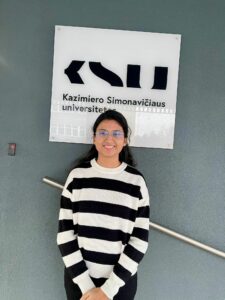 Meet Thivyaprabha Balakrishnan Karthikeyan, a driven and passionate student from India with a bachelor’s degree in English Literature. Having worked as an Assistant Administrator and an English tutor, Thivyaprabha is now embracing an exciting new chapter in her life: pursuing a Master’s degree in Organizational Innovation and Management at Kazimieras Simonavicius University (KSU). When she’s not engrossed in her studies, she enjoys listening to music and exploring new places – hobbies that perfectly complement her adventurous and curious spirit.
Meet Thivyaprabha Balakrishnan Karthikeyan, a driven and passionate student from India with a bachelor’s degree in English Literature. Having worked as an Assistant Administrator and an English tutor, Thivyaprabha is now embracing an exciting new chapter in her life: pursuing a Master’s degree in Organizational Innovation and Management at Kazimieras Simonavicius University (KSU). When she’s not engrossed in her studies, she enjoys listening to music and exploring new places – hobbies that perfectly complement her adventurous and curious spirit.
Choosing KSU: A Decision of Opportunities
Thivyaprabha chose to study at KSU because of its innovative teaching methods and dedication to student success. KSU offers programmes designed to align with real-time industry trends. “The courses are structured to equip students with the practical skills needed to tackle the challenges of today’s dynamic job market,” she explains. Beyond academic excellence, KSU also fit her budget perfectly, making it the ideal destination to pursue her Master’s degree abroad.
Why Lithuania?
Lithuania stood out to Thivyaprabha as a rapidly developing country committed to technology and innovation. It offers international students high-quality education at a fraction of the cost compared to many other European countries. “The reasonable tuition fees and living expenses made Lithuania an attractive option,” she explains. Furthermore, the education in Lithuania is recognised across Europe, providing immense value to her academic journey and future career.
A New Perspective on Education
At KSU, Thivyaprabha found a unique educational culture. “Students here enjoy a balanced approach to learning, with a focus on critical thinking, creativity, and practical application,” she observes. Unlike the education system she was familiar with, KSU encourages students to explore their personal interests alongside academics, fostering a holistic educational experience.
Surprising Discoveries
One of the most unexpected aspects of her studies at KSU has been the teaching approach. Professors adopt a casual and egalitarian style, promoting open communication and making the classroom a comfortable space to learn and grow. “Learning directly from industry experts has been incredibly valuable and a pleasant surprise,” she adds.
KSU’s Strengths and Areas for Improvement
Thivyaprabha is particularly impressed by KSU’s integration of industry expertise into its curriculum. “Students benefit from professionals with years of experience, which bridges the gap between theory and practice,” she explains. Additionally, KSU excels in supporting international students, offering practical teaching methods, modern technology, scholarships, and partnerships with companies to advance career development.
Still, there’s room for growth. Thivyaprabha suggests that expanding opportunities for real-world project work and enhancing networking events could further enrich students’ experiences.
Insights from Lithuania
During her time in Lithuania, Thivyaprabha has gained three key insights:
Affordable Living and Safety – Lithuania offers a high quality of life with reasonable costs, making it an ideal destination for international students.
Work-Life Balance – The culture here promotes a harmonious balance, enabling her to focus on academics while enjoying personal growth.
Rich Cultural and Natural Heritage – Lithuania’s vibrant culture and scenic beauty have left a lasting impression on her.
Looking Ahead
As she envisions the next five years, Thivyaprabha plans to complete her Master’s degree and secure a role in a dynamic organisation. Her focus is on honing practical skills in organisational innovation, navigating real-world challenges, and building professional expertise.
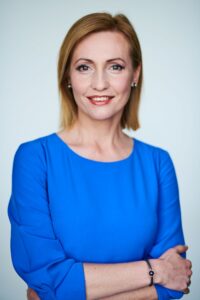 On 9 December 2024, Dr Gitana Neverienė officially began her tenure as the Rector of Kazimieras Simonavičius University (KSU), succeeding Prof. Dr. Jolanta Bieliauskaitė, who had led the university for the past two years.
On 9 December 2024, Dr Gitana Neverienė officially began her tenure as the Rector of Kazimieras Simonavičius University (KSU), succeeding Prof. Dr. Jolanta Bieliauskaitė, who had led the university for the past two years.
Neverienė’s primary goals for the university include fostering the development of well-rounded, creative individuals, enhancing the internationalisation of research, increasing the university’s visibility both in Lithuania and globally, and strengthening its role in society.
The Rector has emphasised that KSU will continue to distinguish itself through innovative approaches to education and research, while nurturing students’ creativity and preparing them for successful careers. “In today’s rapidly evolving environment, it is essential to cultivate critical thinking, openness, and collaboration among students. These skills will empower them to thrive in a global, multicultural professional landscape,” says Dr. Neverienė.
Dr. Neverienė also highlighted the university’s commitment to attracting motivated international students. “We are confident that KSU’s study programmes are highly competitive on the global stage,” she added.
Dr. Gitana Neverienė holds a Master’s degree in Social Sciences (Law) from Mykolas Romeris University, earned in 1997, and a Doctorate in 2001. With over 15 years of leadership experience in higher education institutions in Lithuania, Dr. Neverienė has also held a position at the Ministry of Education, Science, and Sport of Lithuania.
Kazimieras Simonavicius University (KSU) continues to strengthen its network of social partners. On 3 December, the university signed a cooperation agreement with the State Consumer Rights Protection Authority, aimed at creating new career development opportunities for KSU students.
The agreement was formalised by KSU Rector, Prof. Dr. Jolanta Bieliauskaitė, and the Authority’s Director, Goda Aleksaitė.

Joana Burn Photography
Prof. Dr. Jolanta Bieliauskaitė highlighted the value of this partnership, stating that it will provide KSU students with valuable insights into the workings of state institutions responsible for public administration. “The activities of the State Consumer Rights Protection Authority focus on consumer rights protection, making internships here particularly beneficial for future legal professionals trained at KSU. Additionally, the complexity of the institution’s operations makes it an ideal place for students from the Integrated Communication and Organisational Innovation and Management programmes to undertake their professional internships,” she explained.
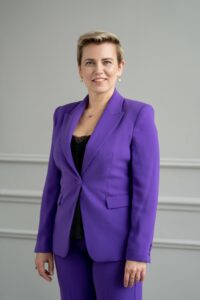 Goda Aleksaitė, Director of the State Consumer Rights Protection Authority, emphasised that the partnership would also foster joint scientific research and the implementation of various projects as part of academic, study, and professional development programmes.
Goda Aleksaitė, Director of the State Consumer Rights Protection Authority, emphasised that the partnership would also foster joint scientific research and the implementation of various projects as part of academic, study, and professional development programmes.
The Authority oversees the implementation of national consumer rights protection policies across key areas, including consumer rights, the non-food products market, and the supervision of tourism service providers. It is committed to ensuring effective consumer rights protection that aligns with European Union legal standards.
The ability to identify, assess, and manage security risks has become crucial for any security specialist, manager, company owner, or CEO. But how can these skills be effectively trained within a company or organization? Where can learning materials be found? Seven ERASMUS+ project partners have developed various training materials for security risk management, aligned with ISO 31000, the international standard for risk management. Teachers and students are invited to freely use a range of resources from the SECUREU web platform, including video lessons, security vocabulary, reading materials, and practical exercises!
During the past years security issues have become an important aspect to many European countries. World is coping with a wide range of challenges such as migration, cyber-attacks and other new difficulties, including virus led crisis.
This leads to the fact that there is a need not only for high quality training for young security specialists, but also for the training that will allow them to be better prepared for the crisis, as well as possibly to eliminate many dangers before they happen and turn into a crisis. The teaching of security risk management has become an important component in various educational programs, not just in security.
These were the reasons why seven partners from six countries – Latvia, Lithuania, Finland, the Netherlands, Spain, and Norway – came together to develop up-to-date digital teaching materials on security risk management. In frame of ERASMUS+ SECUREU project partners aimed to establish a sustainable security specialists’ network, which can cooperate on long term bases. During the project we also developed recommendations for Universities which are preparing security specialists in Europe.
Project partners organised several common activities – survey among the students and teachers, organised round table meetings of experts in all six partner countries. During round table meetings all specialists emphasised that a security specialist must be taught to think broadly and see things in context – it is important to understand organisational strategies, think strategically, provide new specialists with leadership and management skills, and also improve communication and so-called soft skills. Many challenges of the industry already now and in the future are directly related to digitisation, artificial intelligence and technology. It is critical to provide security professionals with knowledge in IT, cyber security and technology fields. Despite the different geographical position of each country, the level of economic development, the various policies in the field of security, the conclusions of the experts of all countries were very similar. In the project web platform you can find more information and read the full report from the round table meetings.
Results of the project
Main target groups of the project are teachers and students of security field, faculties and Universities and training centres providing education and training on security and security field professionals. On the project web platform, you will find different tools and materials on security risk management:
Here you will be able to watch video recording from different conferences and events, as well will find reports on survey and round table meetings.
Final conference of the project took place on 7th of November 2024 in Riga, Latvia. Conference video is available on Turiba University Facebook account: https://www.facebook.com/Biznesa.augstskola.Turiba
PROJECT WEB PLATFORM: https://security.turiba.lv
Project is financed by ERASMUS+ programme
Project number: 2021-1-LV01-KA220-HED-000023056
Project partners: Turiba University (Latvia), Kazimieras Simonavičius University (Lithuania), Laurea University of Applied Sciences (Finland), Nord University (Norway), Avans University of Applied Sciences (the Netherlands), Fundació Universitat Autònoma de Barcelona (FUAB) (Spain), Biedrība “Drošības profesionāļu asociācija” (Latvia)
After graduating from Vilnius Jonas Basanavičius Gymnasium, Eglė is now in her third year studying Fashion Industry in the bachelor’s programme at Kazimieras Simonavicius University (KSU). Her passion for art and creativity became apparent during school, which is why she also attended art school.
Fashion and art – connected
“Fashion and art are closely connected – both express creativity and emotions. Fashion can be seen as a visual art that allows people to communicate their identity. Creating fashion requires artistic thinking, a sense of aesthetics, and the ability to understand how different elements can complement one another,” says Eglė.
For Eglė, fashion is not just about choosing clothes or accessories but also a form of self-expression. She observes that emotional states often influence clothing choices. “Fashion allows me to experiment with styles, colours, and shapes. In doing so, I express my personality and mood,” she adds.
Studies and practice
Eglė studies fashion from the perspectives of communication, marketing, and business management, but she is currently more interested in the practical side of fashion. Her passions include sewing, construction, and sketching. “I am especially fascinated by the details of product creation. To design harmonious clothing details, a great deal of knowledge and practice is needed,” she notes.
Eglė is actively learning the basics of sewing at a vocational school, intending to use this knowledge to create her collections. She is pleased that KSU provides opportunities to engage in additional activities needed to realise her dreams.
Choosing her studies
Asked why she chose Fashion Industry studies, Eglė recalls knowing since school that she wanted to study a discipline related to the arts. When she discovered the programme offered at KSU, she immediately felt it was the right fit. “At that moment, I thought: ‘Oh, this is really my thing!’” she remembers.
She describes the study programme as interesting and multifaceted. She was impressed not only by the lectures and activities but also by the competent lecturers.
Challenges and goals in fashion
Eglė highlights sustainability as a pressing issue in the fashion industry, which is further aggravated by fast fashion. “My goal in the future is to encourage consumers to choose high-quality, eco-friendly products, even if they cost a little more,” she says.
During her studies, Eglė has encountered many opportunities, including the “Erasmus” exchange programme, which allowed her to study in Spain for six months. The university also regularly hosts guest speakers from various fields who share their experiences. “Opportunities are available to everyone equally; you just need to know how to take advantage of them,” she emphasises.
Future
When asked where she sees herself in 10 years, Eglė says she aims to earn a master’s degree. She dreams of creating a collection highlighting women’s inner beauty. “Since I adore pink and everything girly, the collection will be pink. It will feature dresses made of voluminous materials, suits, and similar creations designed for the grand stage,” she shares. However, Eglė stresses that this is still just a dream, but having dreams is very important.
To future students, she advises not to fear pursuing their goals. “If you have a goal, you will definitely achieve it,” she says, offering encouragement. According to her, a unique perspective and creativity are key to finding one’s place in the fashion world.
A Visionary in Fashion and Lifestyle Culture
Prof. Dr Eugenijus Skerstonas, an expert in lifestyle culture and a prominent academic, has dedicated over a decade to shaping the future of fashion professionals at Kazimieras Simonavicius University (KSU). His insights and passion have not only influenced students but also elevated the discussion about fashion in Lithuania.
Fashion is a phenomenon that evokes wonder and admiration, says Prof. Skerstonas, reflecting his deep appreciation for the transformative power of fashion. As the author of ten books on lifestyle culture and a public intellectual, he brings a wealth of knowledge and enthusiasm to the classroom.
Encouraging an Appreciation for Appearance
The professor advocates for a nuanced understanding of fashion’s role in society, countering the perception of it as superficial. “Our behaviour and appearance are important. If we wish to present ourselves as true Europeans, we must encode this aspiration in our attire,” he explains. He believes appearance reflects a nation’s identity and economic standing, asserting, “The better we look, the better we live.”
While he observes significant improvements in how Lithuanians dress, Prof. Skerstonas encourages further efforts. He also applauds young people for seeking individual styles: “Today’s youth do not blindly follow fashion trends. They create their own unique styles by incorporating elements from the past, such as Art Deco.”
A Unique Programme at KSU
The Fashion Industry programme at KSU stands out for its innovative and holistic approach, covering rarely taught subjects such as fashion psychology, appearance culture, and costume history. “Our thematic coverage is extensive. At KSU, we address topics that are not discussed in other universities’ programmes,” says Prof. Skerstonas.
He is particularly proud that the programme was accredited for seven years in 2024, calling it “a significant recognition of our maturity and competitiveness in the European higher education context.” Students who have experienced fashion education abroad have often noted that KSU’s programme is “more engaging and comprehensive.”
Preparing Specialists for a Dynamic Industry
The programme focuses on communication, business, and marketing aspects of fashion, preparing students for diverse roles in advertising, personal styling consultancy, and management. Prof. Skerstonas emphasises the industry’s growing demand for specialists who can analyse consumer behaviour, understand fashion trends, and apply fashion psychology.
“We talk extensively about consumer behaviour research and fashion psychology, preparing specialists who are already in demand. These professionals are crucial for working with renowned global brands in Lithuania,” he explains.
He also sees potential for collaboration with major retail chains, which, in his opinion, should play a more active role in shaping the industry. “It’s hard to understand why major shopping centres are not active social partners. They could contribute to shaping the profiles of specialists and provide employment opportunities“.
Facing Global Challenges in Fashion
As the fashion industry faces issues such as sustainability, overproduction, and climate change, Prof. Skerstonas underscores the role of universities in preparing specialists who can adapt to these challenges. “Universities must collaborate closely with strong commercial sectors to ensure graduates are equipped to meet the demands of the evolving job market,” he says.
Discover more about the innovative Fashion Industry programme at KSU and explore how it prepares students for career opportunities in one of the world’s most dynamic industries by visiting KSU’s Fashion Industry programme.
In November, Kazimieras Simonavičius University (KSU agreed to collaborate with Skyllence – a company specialising in organising charter flights, offering flight planning and execution services.
This partnership will create valuable career and learning opportunities for students in KSU’s Aviation Management Bachelor’s and Master’s programmes.
It has been agreed that Skyllence will offer KSU students and participants of the Aviation & Space Academy lectures, internship opportunities, and other activities, where experienced experts from the company will share their industry knowledge.
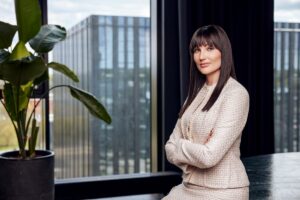 Vilma Vaitiekūnaitė, CEO of Skyllence, states that the company is ready to share its long-standing experience and expertise with KSU students, future aviation sector professionals. “As the aviation industry grows, we face a shortage of aviation administration specialists, and we see KSU, which trains the professionals needed in the aviation market, as our strategic partner in addressing this issue. We are therefore thrilled to offer students more opportunities to test themselves in different areas of aviation. We are ready to help deepen knowledge about charter flight organisation, which is our company’s area of expertise,” she says.
Vilma Vaitiekūnaitė, CEO of Skyllence, states that the company is ready to share its long-standing experience and expertise with KSU students, future aviation sector professionals. “As the aviation industry grows, we face a shortage of aviation administration specialists, and we see KSU, which trains the professionals needed in the aviation market, as our strategic partner in addressing this issue. We are therefore thrilled to offer students more opportunities to test themselves in different areas of aviation. We are ready to help deepen knowledge about charter flight organisation, which is our company’s area of expertise,” she says.
Deimantė Žilinskienė, Head of the School of Business Innovation and Communication at KSU, says that with this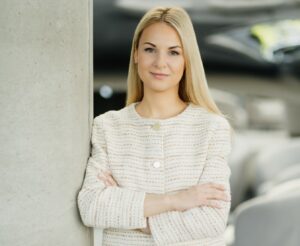 partnership, Skyllence demonstrates social responsibility by investing in the next generation of aviation professionals. “By offering invaluable insights from their field of activity, the company will contribute to the professional development of KSU students and others interested in the aviation industry,” she notes.
partnership, Skyllence demonstrates social responsibility by investing in the next generation of aviation professionals. “By offering invaluable insights from their field of activity, the company will contribute to the professional development of KSU students and others interested in the aviation industry,” she notes.
About Skyllence:
The charter flight company serves clients from the business, sports, music, entertainment, and cultural sectors, offering flexible and tailored flight solutions. With years of experience, the Skyllence team collaborates only with reliable partners who meet the strictest safety standards, selecting the most suitable aircraft and routes for each client, ensuring all flights are carried out to the highest service standards.
The company handles even the most complex private jet hire and logistics requirements, fulfilling the most demanding customer requests.
In October, Kira Skrypnyk joined the Science and Competence Center at Kazimieras Simonavičius University (KSU) as Senior Career and Integration Manager. Her role focuses on guiding students toward successful career and building their professional networks.

Joana Burn Photography
“We want our students to be fully prepared for their careers, and we’re thrilled to welcome Kira Skrypnyk to our team. Kira brings valuable experience in academic product development, marketing, and communication,” shares Rector Prof. Dr. Jolanta Bieliauskaitė. She emphasizes the importance of a smooth start to students’ professional journeys, helping them enter the job market with practical experience and established connections.
The Rector also notes that the Career and Integration Manager’s activities will go beyond traditional career support. “Our goal is to build strong partnerships with well-known companies and organizations in Lithuania and across Europe. These partnerships will provide students with internship and job opportunities, as well as exclusive access to industry expertise,” she adds.
In line with this goal, KSU, together with social partners, plans to organize training sessions, knowledge-sharing events, and seminars on career and integration topics such as business, human resources, and communication. These partnerships will allow KSU students to learn about current business practices and gain valuable insights into the evolving job market.
 “We understand that preparing students for the future means not only equipping them with academic knowledge but also helping them understand how the business and industry worlds operate. Many of us remember the challenges we faced after graduation, moving into the next stage of our careers. This experience underlines our commitment to providing students with both practical skills and professional networks. We deeply value the social responsibility shown by our partners. Their commitment to supporting our career counseling initiatives will have a significant impact, contributing to a stronger job market and creating growth opportunities for a new generation of professionals,” emphasizes Kira Skrypnyk, Senior Career and Integration Manager.
“We understand that preparing students for the future means not only equipping them with academic knowledge but also helping them understand how the business and industry worlds operate. Many of us remember the challenges we faced after graduation, moving into the next stage of our careers. This experience underlines our commitment to providing students with both practical skills and professional networks. We deeply value the social responsibility shown by our partners. Their commitment to supporting our career counseling initiatives will have a significant impact, contributing to a stronger job market and creating growth opportunities for a new generation of professionals,” emphasizes Kira Skrypnyk, Senior Career and Integration Manager.
Students can find more information about career and integration opportunities here.
SECUREU project partners are organizing the conference “SECURING TOMORROW: Preparing security specialists for future challenges” which will take place on November 7, 2024.
The conference will discuss the future challenges of the security field – how to conduct high-quality training of security specialists and how to prepare for security challenges in the future. Security professionals, lecturers and students are invited to participate in the conference.
The conference will feature a panel discussion titled “Does the security and defense industry have enough regeneration and how to promote it?” Experts will debate whether Latvia is successfully preparing enough new specialists in the field of security and defense and what needs to be done to attract young people to the sector. They will also discuss whether these new specialists have adequate skills and knowledge, as well as the future skills that security professionals will need.
Conference will take place in Riga, Turiba University, Latvia.

The conference will be livestreamed on Turiba’s Facebook page: https://www.facebook.com/Biznesa.au
Security professionals, lecturers, students, and anyone interested are invited to participate in the conference. Registration is open until November 1, 2024.
REGISTER HERE (only for on-site participation)
Participation is free of charge, and the working languages will be English and Latvian. Simultaneous translation will be provided.
The conference is organized as final dissemination event of ERASMUS+ SECUREU project. As part of this project, seven partners from Latvia, Lithuania, the Netherlands, Norway, Finland, and Spain have developed various educational materials in the field of security risk management.
